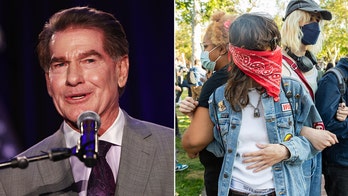The metaphoric blur streaking across Capitol Hill Monday night will be the expected passage of two more judicial nominations bringing the total number of judges approved by the Senate this year to a whopping five.
In the past two years, only 60 of President Obama's judicial nominees ended up putting on a black robe, which means that within the last couple of weeks, lawmakers have moved forward nearly 10 percent of the nominees they were able to approve in the entirety of the last Congress.
It is still too early to determine if senators have taken to heart the complaints about the speed and efficacy of the nomination process recently echoed by Chief Justice John Roberts, White House Counsel Bob Bauer and U.S. District Judge John Roll who was killed in the Tucson shooting spree last month. But critics are likely pleased with how the year has started.
"I hope by the votes we had last week and again tonight means we're going to back to the days of regular order," Senate Judiciary Committee Chairman Patrick Leahy, D-Vt., said on the Senate floor before Monday's votes.
One out of every nine federal judicial posts is vacant meaning 100 positions are unfilled. Half of the openings are in courts where multiple vacancies have led to "judicial emergencies" where the number of cases exceeds the capability of the court to handle in a timely manner.
Speaking in Washington earlier this month, Bauer focused on what he called a "perilously low" confirmation rate and vowed to work with the Democratic-controlled Senate to get more nominees through the process.
He said the effect of so many vacancies was predictable and pernicious with "a massive backlog of cases causing egregious delays for Americans seeking their day in court across the country."
Bauer highlighted the concerns expressed by Roberts in his year-end report that the issue deserved urgent attention.
"Each political party has found it easy to turn on a dime from decrying to defending the blocking of judicial nominations, depending on their changing political fortunes," Roberts observed.
Indeed, the reasons cited for the backlog depend on which politician you talk to. Republicans point to the relative lack of nominees coming from the White House. Obama has yet to announce appointments for more than half of the current vacancies.
Democrats complain about Republican obstructionism for nominees that have already been announced or even passed by the Senate Judiciary Committee but are unable to make it to the Senate floor.
The appellate court seat formerly held by Roberts until his high court nomination is the most extreme case of lawmakers being unable -- or unwilling -- to reach agreement. The spot has been vacant for nearly five-and-a-half years. Caitlin Joan Halligan's confirmation hearing was held Feb. 2.
A recent agreement by Senate leaders to use fewer parliamentary maneuvers could loosen up the process. So too could the ascension of Sen. Charles Grassley, R-Iowa, to the ranking member spot on the Senate Judiciary Committee.
"Given the number of vacancies, it's imperative we work together," Grassley said in a committee hearing last month.
But there are potential landmines ahead that could turn the good will back into what Roberts called a persistent problem. Of note is the much criticized nomination of Goodwin Liu for a seat on the Ninth Circuit U.S. Court of Appeals.
The Senate has twice sent back the nomination of the University of California at Berkeley Law School assistant dean to the president and each time Obama has sent Liu's name back to the Senate.
Grassley's stated commitment to work with his Democratic colleagues was immediately tempered by the significant condition under which that participation will occur. "I'll work with the Chairman and all members to advance consensus nominees," Grassley declared.
Liu is anything but a consensus nominee. A Senate Judiciary Committee spokeswoman says no decision has been made on whether to hold another hearing on Liu or when another vote would be scheduled. She notes that Leahy and Grassley continue to discuss the matter.
Tuesday's floor votes are for James Graves to a seat on the Fifth Circuit U.S. Court of Appeals and Edward Davila for a District Court posting in California. Both passed unanimously through committee.




